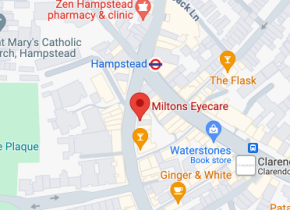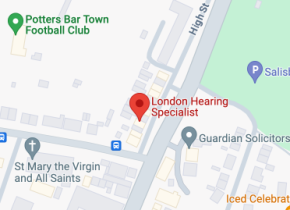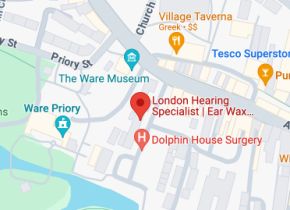Hearing Test Price
Other clinics may offer a free basic 10 minute hearing test but our full, diagnostic test will provide you with a complete picture of your ears health.
Adult Hearing Test for £30
Your appointment will last around 30 minutes and will reveal an in depth report of the health of your outer, middle and inner ear.
Home Visits start from £95
Please contact us for further information.
The 6 stages of our test include:
- Extensive Medical History
- Otoscopy
- Video Otoscopy
- Full Hearing Assessment
- Explanation of Results
- Recommendation & Solution
What To Expect At Your Hearing Test
Extensive Medical History
Extensive information relating to ear health, hearing health and general health.
Otoscopy
Look inside the ear with a medical instrument which will show the health of the ear canal and ear drum.
Video Otoscopy
Live video showing the inside of your ear including key points such as the ear canal and ear drum with a full explanation along the way.
Full Hearing Assessment
Pure Tone Audiometry with Air-Conduction and Bone-Conduction testing. Full spectrum of frequencies tested allowing us to understand complete hearing ability and location of hearing loss in the auditory pathway.
Explanation of Results
Your Audiologist will talk you through your hearing test results and will be able to diagnose and let you know what is causing your hearing problem.
Recommendation & Solution
We will recommend the best solution to you based on your test results.
Free vs Paid Hearing Tests
There are 2 main reasons that you may wish to choose a paid hearing test over a free hearing test. First, when you pay for a hearing test you can be assured that a fully trained and experienced audiologist will be performing the test. Also, a paid test will be conducted in a fully sound-treated room or booth with multiple tests being performed to get a complete picture of your hearing and your ear's health.
Audiologists vs. Audiometrists
Both are healthcare professionals who seek to improve the lives of people with hearing loss however each has different qualifications and responsibilities. An audiologist specialises in medical assessment and management of hearing loss, identifying, treating, and monitoring disorders of the auditory and vestibular systems. However, audiometrists specialise in the non-medical assessment and management of hearing loss and have a reduced scope of practice compared to audiologists
Basic Vs Complete Test
A complete hearing test should offer Otoscopy and Pure Tone Audiometry with Air-Conduction and Bone-Conduction testing. The full spectrum of frequencies should be tested allowing for the understanding of the patient's hearing ability and location of hearing loss in the auditory pathway. A free hearing test is usually just a screening and it will be a quick 5 or 10 minute test that you will simply pass or fail.
A paid hearing test is usually performed in a sound-treated room or booth and is carried out by a fully trained and experienced audiologist.
Alternatively, a free hearing test can take place in a storefront, sound-treated room or booth and can be carried out by an audiologist, audiometrist, nurse, or hearing clinic receptionist.
Find Our Specialised Audiology Clinics
Explore our seven dedicated clinics, each uniquely equipped to provide exceptional, individualized audiology care tailored to meet your hearing and balance needs.



Hearing Test London FAQ's
- What are the main types of hearing tests?The main types of hearing tests include pure-tone audiometry, speech audiometry, tympanometry, OAE testing, and auditory brainstem response (ABR) testing. Our experts can recommend additional tests based on their observations.
- How can I prepare for my upcoming hearing test?When coming for your hearing test, we recommend gathering any medical information, such as a history of hearing loss or any medication that may affect hearing, and bringing a list of symptoms or concerns about hearing ability.
- What should I expect during a typical hearing test?During a hearing test, expect a consultation to discuss your medical history and concerns. This is followed by several tests, such as pure-tone audiometry, tympanometry, speech audiometry, and otoacoustic emissions (OAE) testing. These tests are designed to evaluate hearing ability and identify any potential issues. The results of the tests will be analysed and discussed with the patient, and any recommendations for treatment or next steps will also be discussed.
- How do I interpret the results of a hearing test?You don't have to worry about interpreting the hearing test results. Our audiologist will analyse your responses to each test, compare them to normal data, and discuss the results and what they mean for you and your hearing health. The audiologist will also provide a diagnosis and recommend any necessary treatment options or management strategies.
- How often should I take hearing tests?How often you should take hearing tests depends on various factors, including your age. However, it is recommended that you take the tests every few years, preferably every three years.
Types of Hearing Tests
We offer various types of hearing tests to ensure we capture every aspect and part of the ear, including the following:
Pure tone audiometry
Pure tone audiometry, or PTA, is the most common and fundamental hearing test. It measures an individual's hearing across various frequencies. PTA can help identify the type of hearing loss you may have, quantify the extent of your hearing impairments, and identify the softest or threshold sounds that a person hears at different frequencies.
This test is also crucial in informing audiologists about an individual’s specific hearing needs and prescribing and programming the right hearing aids.
The test is conducted in a soundproofed room to eliminate noise interference. You will wear headphones connected to an audiometer.
Speech audiometry
The hearing test also includes a speech audiometry test. The test evaluates your ability to understand and process speech sounds. The procedure is similar to a pure tone audiometry test. You will also be seated in a soundproof room or a quiet environment for the test. You will be provided with recorded speech signals at a range of intensity.
Bone conduction testing
Bone conduction testing enables us to identify whether hearing is in the ear's outer, middle, or inner part. This involves placing a small vibrator called a bone oscillator on the bone behind the ear or the forehead.
The oscillator presents sounds onto the bone, bypassing the outer and middle parts of the ear and going directly to the cochlea.
Bone conduction testing establishes whether the identified hearing loss is conductive mixed or sensorineural.
Conductive hearing loss arises from issues in the outer or middle ear. Examples of conductive hearing loss include wax occlusion, hole or perforation of the eardrum, or a middle ear infection.
Sensorineural hearing loss is developed when damage to the hearing organ or the nerve in the brain.
Why You Should Take a Hearing Test?
Getting a hearing test is one of the best and fastest ways to maintain your hearing and identify potential problems quickly. Hearing testing is simple and pain-free, and it helps you retain better hearing so you never have to miss a moment, big or small.
Other reasons to get a hearing test include:
Hearing tests are painless
Getting your hearing tested by a hearing care professional is pain-free and available in our different locations in London. The process is so simple that you will wonder what the worry was about. It takes about 30 minutes, so you can schedule to have the test during your lunch break.
Regular hearing screenings are recommended once you’re 50
You should get your hearing checked or tested every three years. It's a great way to track your hearing and stay proactive about your overall health.
You may have hearing loss and not realise it.
Many people who come for a hearing test have mild hearing loss and don't even notice it. Hearing loss can be subtle and blend into life. A hearing test can help unearth any signs of hearing loss, and the sooner you know it's there, the sooner you can get treatment and preserve your hearing.
Hearing loss can impact your emotional wellbeing
Your hearing completes your life and helps you become more social. It is common for people with hearing loss to have a higher risk of social isolation. Conversely, good hearing can help you stay connected with the outside world.
Hearing loss can be an early warning sign of flag other issues
Another reason to consider a hearing test in London is that some hearing symptoms can be associated with other health conditions such as cardiovascular disease and diabetes. This is why keeping up with hearing tests can be a proactive way to keep up with your health.
Most of the problems identified through hearing tests can be treated and prolong your hearing. However, the success of this treatment depends on the early identification of the symptoms, which makes hearing tests important.
